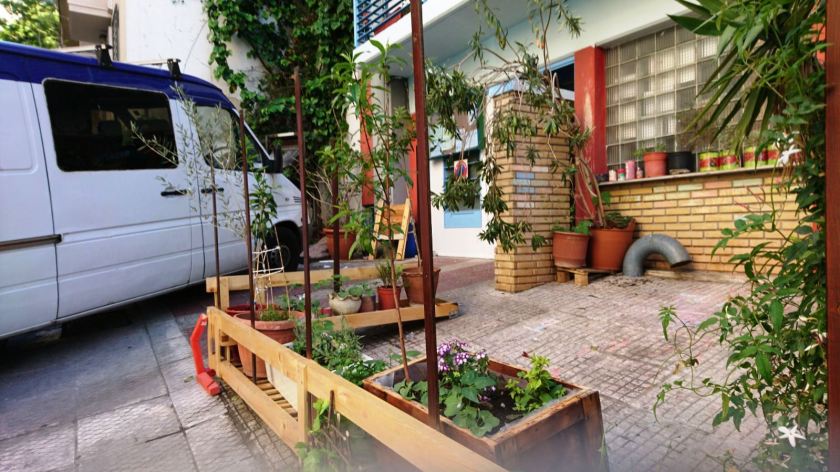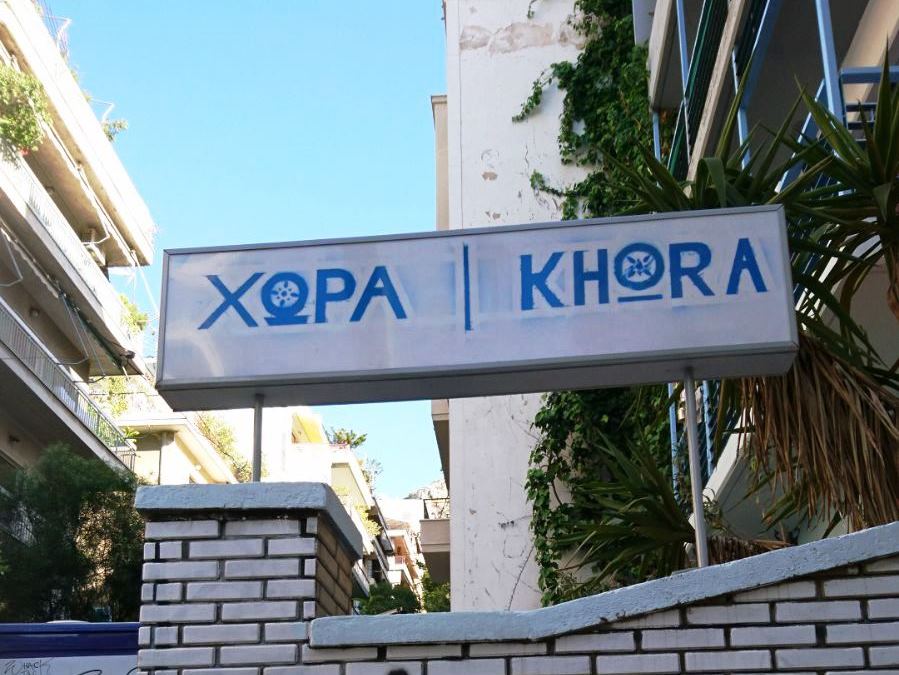Earlier this week I wrote about global issues, social justice and the possible imperative to bring those issues into the classroom. So it’s only fitting that I take the opportunity to talk about the opposite ― taking the classroom into the world.
Fresh from our workshop at IATEFL 2017, my Dynamite blogging partner Lindsey Clark has just arrived in Athens to volunteer as a teacher trainer at the No Border School, an association dedicated to empowering refugees and migrants through language teaching.
I urged her to write something about it for the blog. When she told me she was (understandably) too busy settling in and preparing for her workshop, I suggested an interview by phone to get her first impressions. (All photos by Lindsey Clark)
What’s it like there?
It’s like no school I’ve ever worked in, that’s for sure. I’m volunteering for the No Border school which is collaborating with, partially housed in, but funded separately from the Khora Community Center (or see here, on Facebook). At the center they run classes and provide services to help refugees/migrants ― there’s a kitchen, a creche where parents can leave their kids with volunteers as they attend classes, medical assistance and dentistry. There’s also a workshop where they make furniture for the building.
So language teaching is only one aspect; they teach German and French as well. The No Border school works partly from the center but also in other locations around Athens.
What’s the plan for the workshop?
I’m going to be training volunteer teachers in some of the basics. Some have teaching but not EFL experience, others may have no experience at all. They’re from a variety of different countries, as well: Italy, Spain, Greece, France, America, Canada and Brazil. Some have been here for a few weeks or months and some have just arrived. So the first step is figuring out what knowledge and experience the volunteers are bringing with them.
They might need to know about things like lesson planning, giving instructions, setting up activities. One thing we might work on is simply awareness of learner language level and knowing how to grade your own language.
I’m going to both share some of the no-prep activities we demoed at our IATEFL workshop as well as trying to find out where they are with their actual knowledge of grammar. The plan is to start with examples, find out what they know, have them do some basic research, and then help them create exercises.
The school would like to get on online platform up and running to help start the volunteers on training tasks before they come, and I’ll be helping them with that. New teachers are coming all the time. Anyone can sign up for minimum 2 weeks.
What are the students like?
To be honest, I don’t know personally yet. Just judging from the translators and what I’ve heard there are Syrians, Kurds and Afghans. Urdu speakers and Farsi speakers. I’ll find out more as the week unfolds.
What’s the English-language program hoping to achieve with the students?
For some students, they’ve got to start with basic literacy skills in English before they do A1, mostly due to unfamiliarity with the English alphabet.
But others come in with a great background already. I know there are IELTS classes already going. And the exam fees will be paid through funding and donations.

What kind of materials or resources do you have to work with?
I have to say I was amazingly fortunate to get great help from the publishers at IATEFL. I had checked out No Border’s Amazon Wish List when I was in Glasgow and managed to talk to a number of publishers before the book fair was closed.
Lucy Constable from National Geographic donated a ton of coursebooks from their Life series at from beginners to upper-intermediate, as well as a range of IELTS books. Pearson was also a huge help with lots of graded readers. I brought it all down in the car with me from Glasgow, including a printer got donated as well.
The volunteers are busy writing up a syllabus based on these coursebooks.
How did you get involved with this in the first place?
I wanted to go to Greece. I also wanted to get involved in teacher training, and do it for a worthy cause. I heard about another school setting up schools in tents. I contacted them but didn’t hear back from them.
Then I found the No Border school ― I think on Facebook. I wrote to them, told them I was interested and asked them if I could bring materials. They said yes, bring anything you can get, and like I said before I set about trying to make contacts at IATEFL for resources. I even gave a very brief talk at the Global Issues SIG day.
When I’m finished I’m going to send an outline of what’s been done to Linda Ruas and Julietta Schoenmann of the Global Issues SIG and then they are planning to come here and do more training sessions.
What’s made the biggest impact so far?
The wonderful thing that I’ve seen so far is that everybody’s patient. Everybody’s kind. Everybody talks and listens to each other. It seems like there are constant meetings because there are so many people to keep in the loop.
I’ve been here such a short time but it’s already a pretty emotional experience.
Yesterday one teacher left who’d been here for six months. It was really difficult for her to tear herself away. You want to give and share as much as you can.
Of course, volunteers don’t have the worst of it. As one refugee said: “You are volunteers ― if it gets too much you can go back to your families and homes.” They don’t have that luxury.
The school and the community center need support.
If you want to donate money or teaching materials (or find out more about what they need), click the link below.





